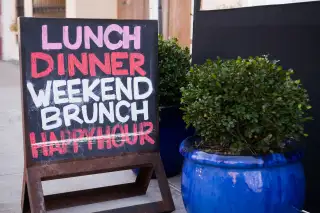These States Still Ban Happy Hour

Illinois turned back into a pro-happy hour state this week, after legislators overturned a 25-year ban on bars and restaurants discounting alcoholic beverages for any period during a day. It joined the likes of Kansas, which made happy hour specials and other drink promotions legal once again in 2012, after 20 years of prohibitions banning such practices.
Yet several states still do not allow "happy hour," meaning a period of time during a day when a bar or restaurant reduces the regular price of drinks. The reasons cited for happy hour bans generally come down to the idea that drink specials encourage binge drinking, thereby increasing the likelihood of drunk driving and other alcohol-related problems. MADD, for one, supports a nationwide ban on happy hour and all business practices "associated with excessive alcohol consumption."
Still, it's not entirely clear that happy hour bans save lives or decrease excessive drinking. A 2013 Boston Globe op-ed argued that states with happy hour bans haven't necessarily seen a larger reduction in drunk driving crashes than states with no such bans. It also pointed out that, surprisingly, some bars and restaurants are among the supporters of happy hour bans—because with the rules in place, drink prices can remain high, as there's no need to compete with the upstart down the block trying to drum up business with a happy hour price war. (Still others say that happy hour bans are bad for business, and getting rid of them makes particular sense in high-density cities where locals are more likely to walk or take cabs than drive to an after-work watering hole.)
A 2005 study by the National Highway Traffic Safety Administration, meanwhile, began by acknowledging, "Happy hours, drinking contests, 'all you can drink' specials, and the like encourage over-consumption by reducing prices, a potent inducement to drinking large amounts of alcohol in short time periods." But at the time researchers found only one study, conducted in Ontario, Canada, that directly tried to evaluate if people actually drank less after happy hour bans went into effect. Their findings? "No significant decline in alcohol consumption was observed following the ban."
Nonetheless, happy hour prohibitions and a wide range of other restrictions on things like "bottomless brunches" remain in effect in many states. The rules are often confusing. Even before Illinois gave the OK to happy hour, it was perfectly legal for bars and restaurants in the state to temporarily reduce the price of alcohol. They just had to discount prices for an entire day—like half-price bottles of wine on Tuesdays—instead of lowering prices for a few hours in a given day.
Other states, such as Virginia, allow happy hour drink specials while maintaining it's illegal for these promotions to be mentioned in advertising anywhere outside the establishment's walls. Oregon is another state with funky rules: Happy hour drink deals are fine, and bars can advertise that they're hosting "Happy Hour," but mentioning specific prices is strictly verboten. Many, many other states restrict what hours can be "happy," i.e., no drink deals allowed after, say, 9 p.m.
Because of the complexities of each state's rules—and the fact that laws rarely use regular-language terms like "happy hour"—it's difficult to nail down exactly which states don't allow happy hour. But if we're using the common understanding of "happy hour," which is a limited window of time during a day when prices are reduced on some or all alcoholic beverages, then the states below indeed have happy hour bans.
Alaska: In addition to bans on alcohol sales between 5 a.m. and 8 a.m., Alaska bartenders cannot give out free drinks, deliver a drink to someone already in possession of two other alcoholic beverages, nor sell drinks at "a price less than the price regularly charged for the beverages during the same calendar week." These and other laws restricting the sale of alcohol have been on the books since 1986.
Indiana: Like other states with happy hour bans, Indiana bars and restaurants are prohibited from reducing alcoholic beverage prices for any window of time during the course of a day. No two-for-one specials and the like either.
Massachusetts: The Commonwealth was the first state to ban happy hour, with legislation passed in 1984 outlawing bars and restaurants from temporarily changing alcoholic beverage prices any time during the course of a week.
North Carolina: Only food can be discounted during happy hour; discounting drinks for a brief period of time is prohibited.
Oklahoma: State laws do not allow establishments to "advertise or offer 'happy hours' or any other means or inducements to stimulate the consumption of alcoholic beverages," and that specifically includes selling drinks "on any one day at prices less than those charged the general public on that day." Some bars get around the somewhat vague language of the laws by discounting drinks for the entire weekend rather than a few hours per day on weekdays, and by calling their specials something like "Cattle Call" rather than Happy Hour.
Rhode Island: No happy hour specials on alcoholic beverages allowed.
Utah: A ban on happy hour drink deals went into effect in 2011
Vermont: Bars and restaurants are not allowed to reduce prices on alcoholic beverages at any point during a day.